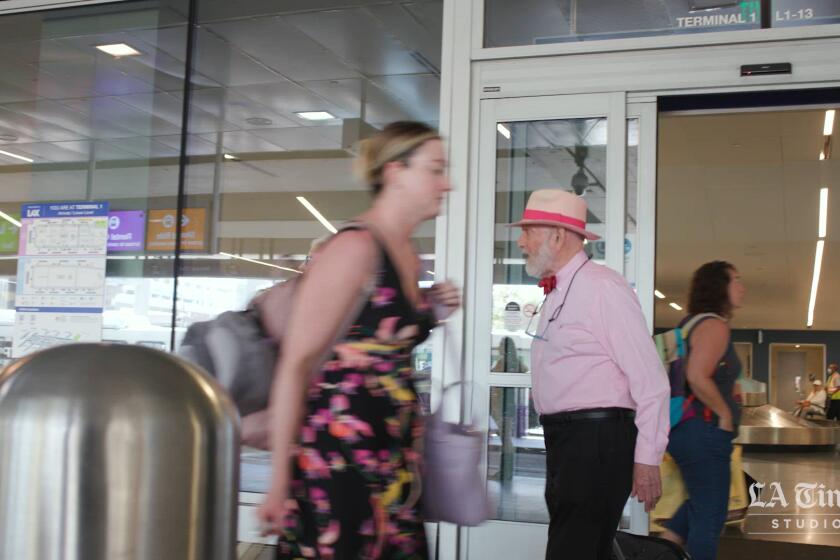Opinion: Why travel and suffer through LAX, flights, lost luggage? Here’s one good reason

As an L.A. native and a professional traveler, I know getting a ride to LAX is rarely fun. But even I was tested in summer 2023 after an Uber and then a Lyft canceled on me when I needed to be at the airport in an hour and a half.
Trying not to throw up for fearing of missing my flight, I drove myself to the familiar parking lot next to the In-N-Out on Sepulveda. I checked in by app, photographed the spot so that later my dad and nephew could retrieve my car, and galloped to the airport shuttle. At the terminal, the woman who checked my bag said I got there in time — with 11 minutes to spare. I tried to think in pass/fail terms: I made it. I would board the plane to Loreto, Baja California, to go scuba diving.
After traveling to more than 100 countries and working on dozens of cruise ships for three companies, I have experienced not just sprints to the airport but also hurricanes, medical emergencies and helicopter evacuations. I’m used to the perpetual horror stories about flight delays, astronomical ticket prices and other challenges. What keeps me going — even more than opportunities to, say, swim with stingless jellyfish in Kakaban Island, Indonesia, or see a 380-foot Buddha statue near Monywa, Myanmar — is that nothing quite compares to the magic of unexpected connections that travel can bring.
On a trip to Israel, after my luggage got lost in transit, a fellow traveler who was joining my group excursion arranged to receive the daily contact lenses I desperately needed in the mail. One new friend shared a dress and another her curling iron.
The help from strangers has gone beyond the practical. To reinvent myself after my divorce, I challenged myself to complete 50 dares around the world before turning 50. Pursuing that challenge in Kenya, I met Maasai warriors who shared their jumping warrior dance. In return, with permission from their chief, I showed them how to Hula-Hoop. With each destination I visited and community I encountered, I felt small parts of myself that had numbed in recent years reengage. The world felt smaller and friendlier.
Some of my favorite encounters have happened by serendipity. At a restaurant in Upolu, Samoa, when I asked my waiter a few words in the local language, he translated a song for me. The next day I headed to the smaller island of Manono, and while walking around I saw elementary school children at recess. Their teacher encouraged them to say hello, talk to me in English and sing. They were thrilled when I could join along because they happened to belt out the song I’d learned at the restaurant the day before.
When he published “Europe on 5 Dollars a Day” in 1957, the young lawyer kicked off a new era in travel, persuading middle-class Americans that London, Paris and Rome weren’t just for aristocrats.
Yes, travel is pretty much always chaotic. It’s impossible to plan for every possible setback, though I have picked up tricks that make it easier. Although I made it to Israel with stops in Germany, Spain and Italy, my lost luggage inspired a discussion with other travelers about the objects we couldn’t live without (for Toni it was make-up; for Kaitlyn, special socks). I realized my contacts should always go in my carry-on next to my passport and Kindle.
I book my flights one way for flexibility. On return trips I often choose a different carrier depending on what is the most direct route and whether I want to arrive at LAX after the worst of rush hour traffic, or I might fly into the calmer Burbank airport. I use packing lists and remind myself that if I forget something, there will be a store. (Even in the “vast expanse of nothingness” on the way to the Gobi Desert in Mongolia, I found Costco’s Kirkland brand in the small stores of tiny towns.)
But ultimately, navigating the logistical maze of transportation issues, hotels and languages is a token toll for the thrill of joining with people for meals, songs, fashion and conversations I would never otherwise experience.
Perhaps my favorite perspective on travel comes from the stamp that Palau adds to the passports of visitors. It’s a contract, a pledge, they are asked to make to “to act in an ecologically and culturally responsible way on the island, for the sake of Palau’s children and future generations of Palauans.”
I hope more destinations will adopt something like this as a reminder to care for one another’s homes as we do for our own. The opportunity to travel and be a guest in other countries has changed my life, and no amount of challenges or inconveniences can distract from that.
Lisa Niver is the author of the award-winning memoir “Brave-ish: One Breakup, Six Continents, and Feeling Fearless After Fifty,” a travel TV host and writer. @LisaNiver












